The heart of Magic: The Gathering is playing with others, and COVID-19 has brought major challenges to our community. Thankfully, though, you can still enjoy and engage with Magic on your own. One solo activity you could try is organizing your Magic collection!
Sometimes, card organization can be time-consuming. In fact, you might have been putting off this task because of just how long it takes! If you find yourself with more free time lately, this is the perfect time to reorganize and update your collection. Here are a few things you can do to keep your Magic collection tidy.
Consolidating
If you’re like me, you have Magic cards strewn about your home. I have cards left over from MagicFests in my luggage. There are remnants of spontaneous pack wars on my coffee table. Some deck boxes in my room are full of old prerelease pools. Just this past week, I found an Overgrown Tomb and a Gideon of the Trials in my living room. All these cards are not where they should be!
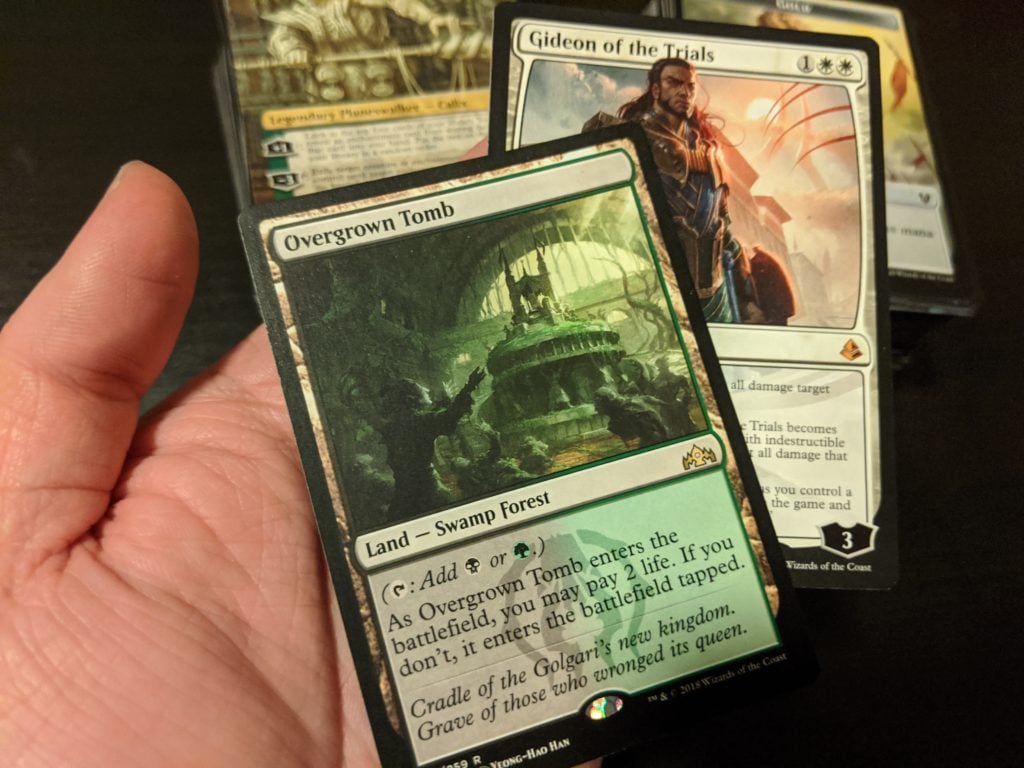
Gather your stray cards and put them into your usual Magic storage locations. I store my cards in three places: binders, cardboard storage boxes, and deck boxes.
I have one binder for cards I want to keep (including cards of sentimental value) and binder for highly-valuable cards for trading/selling. Completed decks go in my deck boxes. Everything else goes into cardboard storage boxes; I use multiple 5000-count boxes.
Sorting
So, you’ve gathered all your cards into boxes and binders. Now it’s time to organize them!
Organizing your cards is a crucial part of the deck-building process. Recently, I was looking for a specific card in my collection — Fool’s Demise. I knew I had a copy from buying the mono-blue Commander 2014 deck. But I didn’t know where I placed it! I looked in box after box and finally found the card after an hour of searching.
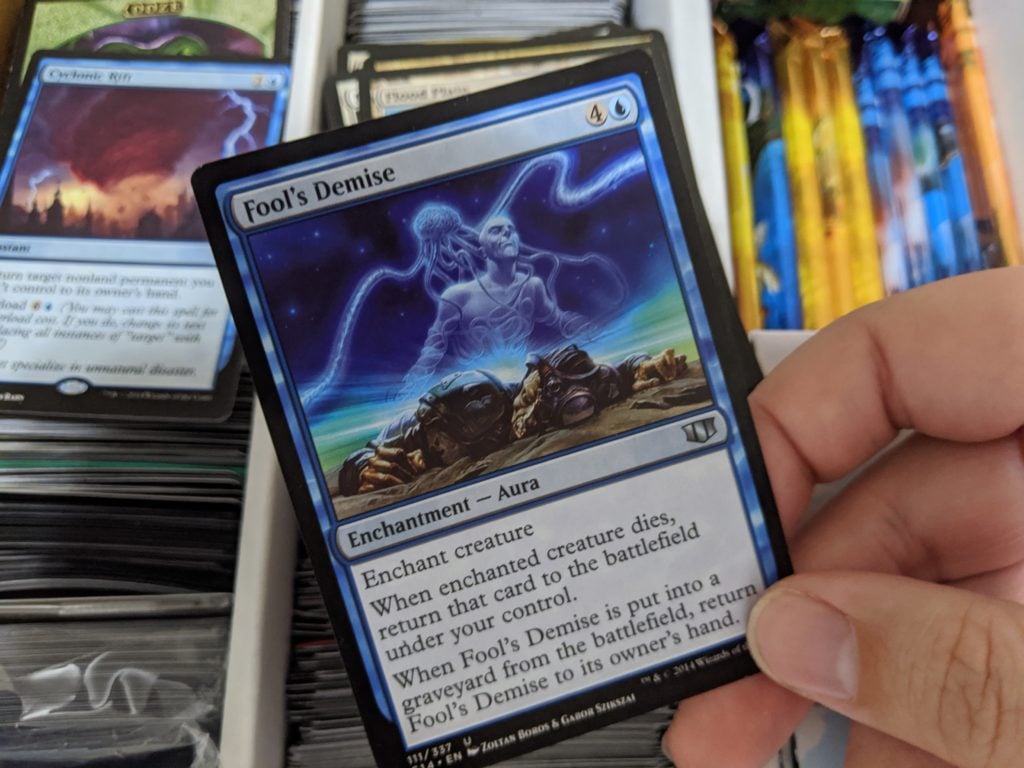
If you’ve ever wondered where a card is in your collection, I suggest spending time sorting. Keep your cards orderly in a manner that makes sense for you.
I like to separate my cards into five categories: valuable cards, Commander staples, tokens, decks-in-progress, and bulk cards. Here’s a breakdown of how I sort within each of these categories:
Valuable Cards
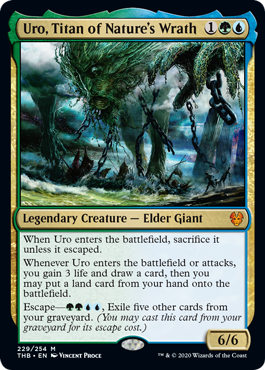
Store everything you’re not selling/trading in a separate binder. Because they’re sentimental in value and not necessarily for playing, organizing further doesn’t matter. You just need a safe place to store your cards.
For cards I’m willing to trade/sell, I organize by set first, working chronologically backwards. This means the first page has the most recent set’s cards. This helps since a lot of desirable cards are in Standard. From there, I’ll sort the cards by color within their sets: white, blue, black, red, green, multicolored, artifact, land.
Commander Staples
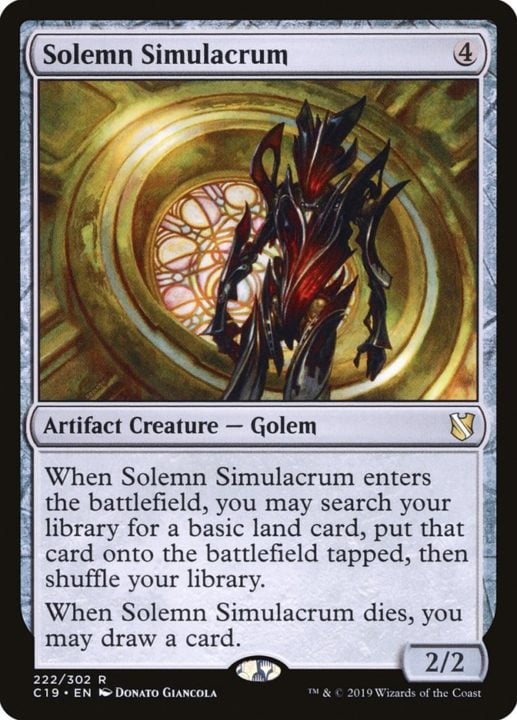
I spend a lot of time creating and updating Commander decks, so I want those staple cards easily accessible. If you play as much Commander as I do, I recommend keeping those cards in a specific box or in a section of your storage container of choice. From there, set is not important; if you build decks by color, it doesn’t really matter when a card was released. When I’m building a mono-red deck, I want to go straight to the red section and find Chaos Warp.
If you find that you still have too many cards to sift through, I suggest sorting into categories like targeted removal, mass removal, ramp, and card draw. If a card fits into several categories —Solemn Simulacrum counts as both ramp and card draw — I’d either pick the primary function (ramp) or put it in a “miscellaneous” category.
Tokens
I use plenty of tokens in Commander, so I choose to store them with my Commander staples. Once I’ve grouped my tokens together, I then sort alphabetically.
Decks-in-Progress
Sometimes, I’ll be working on a deck, and it’ll take a long time to get all the cards together. So, I store what I do have in a “deck-in-progress” section, near my Commander staples and tokens.
Usually, when a deck is in the “in-progress” stage, it contains a lot of potential cards that may not make the cut. Once I’ve finalized a deck list, I sort the rest of the unused cards into the other categories.
Bulk Cards
Since these cards are less important to me, I sort them a bit differently – based on the volume of cards and their purpose. When I look through my bulk cards, I’ll usually be looking for something specific, and I want to find it as quickly as possible. I sort these cards by set, then by color, and then alphabetically.
Updating
As new Magic products are released, there are always new cards to include in your decks. Perhaps Theros Beyond Death provided some new additions to your Hydra deck. Or maybe you have a Cube that can use some of the cards you opened in Mystery Booster packs.
While updating your decks may not take as long as sorting your collection, the process still takes time. You should always budget some time for updating your decks – otherwise, they may remain stale forever!
I’d been meaning to add Powerstone Shards to my Cube, and I bought some newer cards for my Commander deck. But I left all these cards on my desk! Time for these cards to escape their fate.
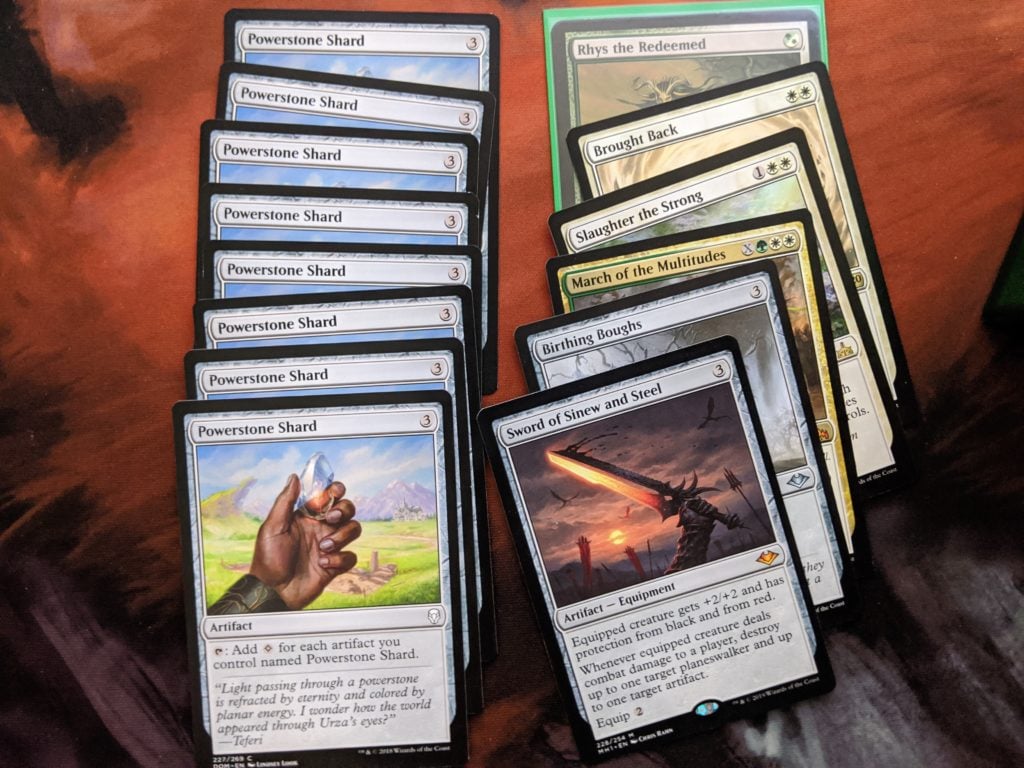
Everyone updates their decks at a different pace. Ideally, I’d update mine whenever a premier set like Ikoria: Lair of Behemoths releases – so, about four times a year. However, because I don’t have a regular playgroup, I tend not to update my decks that often. Instead, I typically go through them all whenever I’m about to leave for a MagicFest!
If you only play Magic every once in a while, you may update your decks just a few times a year like I do. If you play frequently, you may want to update your decks at least once a week! Do whatever makes sense for you – just make sure you’re budgeting the time for this important process.
Resleeving
As you build new decks, you’ll probably want some sleeves to go with them. You may even need to resleeve a few decks if you’ve shuffled them enough. And, of course, you might have awesome new sleeves you want to outfit a deck with.
I’ve had a Modern Burn deck for many years, and it’s been a while since I last resleeved it. I know I’ll need to do so before my next sanctioned tournament.
I also got some cool new Street Fighter Ken sleeves. I’ve been meaning to sleeve up a Chandra Ablaze-themed deck with them, for aesthetics’ sake!
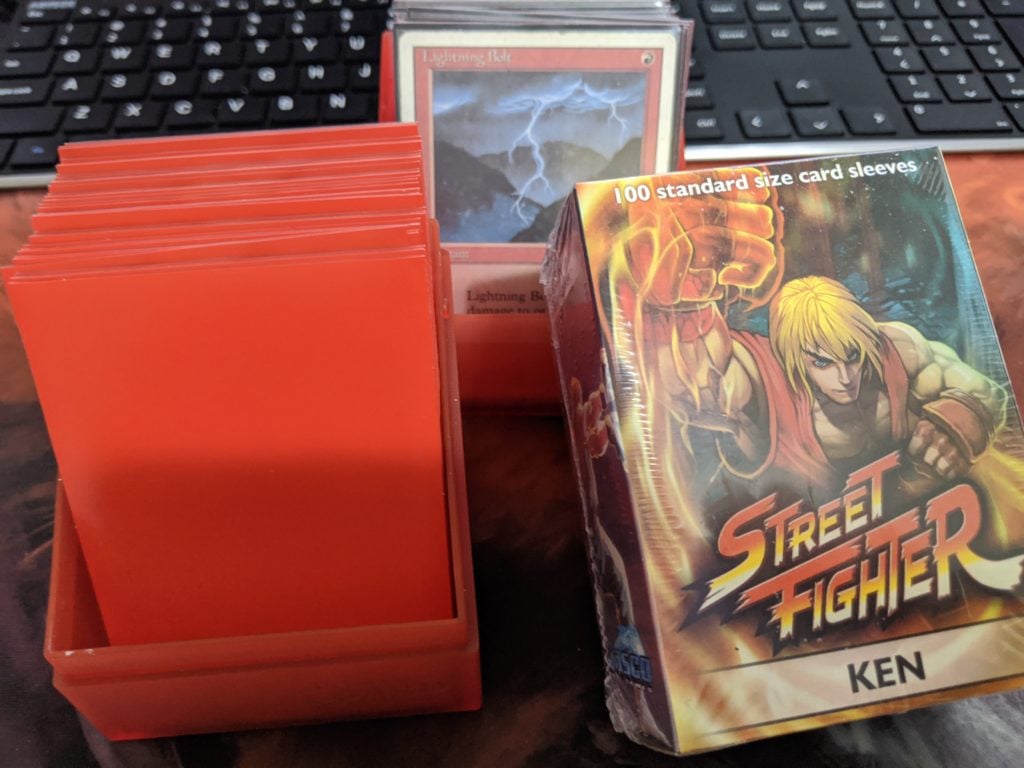
Tips for Buying Sleeves
- If you enjoy sleeves with cool designs on them, try searching Card Kingdom’s collection of card sleeves. You might even find some on-theme sleeves for your next deck, like these Izzet sleeves for your Niv-Mizzet deck!
- If you want the highest-quality sleeves, make sure to visit this page for card sleeves that received high marks from Tolarian Community College.
- If you have foil cards and love seeing them shine, I recommend Dragon Shield sleeves. These won’t dull the shininess of your cards. I also recommend the matte style of sleeves for a better shuffle feel. You can find the two Dragon Shield matte sleeves pages here and here.
- I also like Ultra Pro Eclipse sleeves. There’s a different shuffle feel between Eclipse and Dragon Shields, and I prefer the Eclipse ones in that regard. However, please note: Eclipse sleeves, I’ve found, will make your foils seem more dull in shininess. If you don’t care about how shiny your cards seem to look, then pick up some Eclipse sleeves here.
- Lastly, if you have highly-valuable cards in your Commander decks and Cubes, I recommend double-sleeving. This means buying an inner-sleeve (it’s a tighter fit, so the regular, or outer, sleeves can sleeve over them well). These will protect best against accidents like a spilled drink. I personally prefer KMC perfect fits. I find the side-loading variety easier to insert cards into! Find them at this page.
Selling
As you organize your collection, you might find valuable cards you don’t need! I usually store mine in a binder for trading, but it’s more difficult to trade during these times. Now is a great time to sell your cards to online retailers like Card Kingdom in exchange for some store credit or a gift card that you can use later.
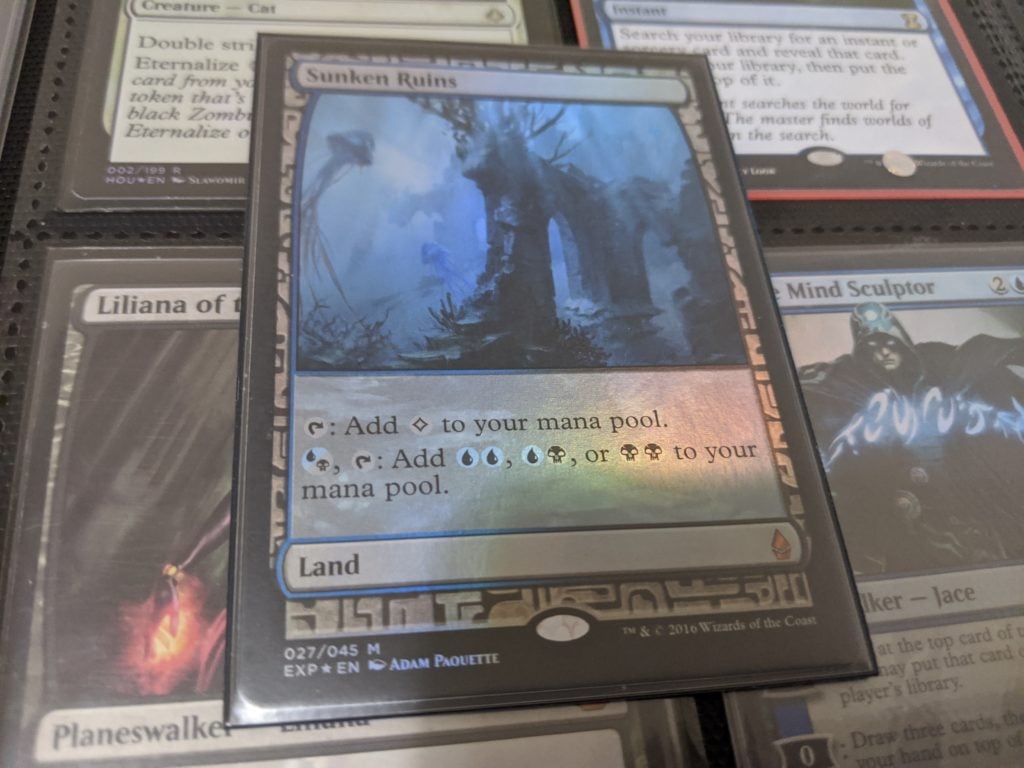
If you haven’t sold to Card Kingdom before, I got you. Follow these steps:
- Go to the “How to Sell” page first and find the sections relevant to you (“Before You Sell — Frequently Asked Questions” and so on).
- In the “MTG Singles/Foils” tab, you’ll find a searchable list of cards that Card Kingdom is currently buying. Search for the cards you want to sell and add any that they’re buying to the cart.
- Once you’re done choosing which cards to sell, head to checkout and choose your payment method. Card Kingdom offers cash or store credit payments; the latter comes with a 30% trade-in bonus.
- Lastly, you’ll need to pack and ship your cards. Refer to the “How to Pack Singles” section on the instructions page.
Conclusion
There’s an unexpected benefit I’ve found when organizing my Magic collection: remembering the good times. Yes, my cards were scattered around the house, or chaotically arranged in my storage boxes. But that’s because the cards are clumped according to my Magic experiences.
I have chunks of Battlebond cards in one box because of a birthday party. My coffee table had cards from pack wars because a Magic friend crashed at my place after a concert. While going through a binder, I found rares from a night of Eternal Masters and sushi with my best friends.
I hope these Magic collection organization tips help you out. I also hope that, as you’re organizing your collection, you remember the good times you’ve had playing Magic and look forward to the games you’ll play in the future. Until we can gather again, you can find me on Twitter at @bradleyrose.

Bradley is a co-host of a weekly Magic: The Gathering design podcast, Beacon of Creation. He was among the Top 101 contestants in Wizards of the Coast’s Great Designer Search 2. He enjoys crafting custom Magic product experiences, like Archfrenemies, and building Commander decks with creative constraints.

